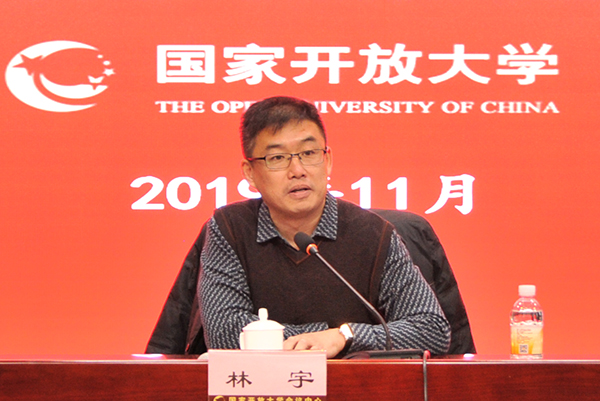 From 18-22 November 2019, a seminar for backbone teachers of the online teaching team undertaken by the Teaching Affairs Department of the Open University of China (OUC) was held at the OUC conference centre. Seventy-seven teachers from the OUC branches and industry and corporate colleges participated in the seminar.
From 18-22 November 2019, a seminar for backbone teachers of the online teaching team undertaken by the Teaching Affairs Department of the Open University of China (OUC) was held at the OUC conference centre. Seventy-seven teachers from the OUC branches and industry and corporate colleges participated in the seminar.
Vice president of the OUC Lin Yu gave the opening speech. Liu Chengbin, an investigator from the Higher Education Division of the Beijing Municipal Education Commission; Yan Jichang, secretary-general of the Modern Distance Education Collaboration Group of the National Higher Education and director of the Office of the Network Education Examination Committee of the Ministry of Education (MOE); Professor Li Qing from Beijing University of Posts and Telecommunications; and Wang Wujun from the Zhejiang Branch were also invited to give themed reports at the seminar.

Lin Yu gave an in-depth analysis of the orientation and problems of open education from four aspects: "what is open education?”, “what is wrong with open education?”, "what should open education be like?”, and "how can open education become what it is supposed to be?”. He explained the follow-up work for open education in detail. He emphasised that open education should provide learners with quality education services that are practical and applicable and convenient and flexible, and that are equipped with well-known teachers, reasonable evaluations, and strong guarantees. With regards to how to improve the quality of teaching, Lin Yu pointed out that on the one hand, we must strengthen governance; on the other hand, we must deepen teaching reform, optimise professional structure, formulate professional standards and curriculum standards, promote examination reform, and rely on modern information technology to strengthen the inspection and supervision of teaching, learning, and governance behaviours.
Ye Zhihong, director of the Teaching Affairs Department of the OUC, gave a keynote speech entitled Discipline Construction and Teaching Team Construction. He conducted an in-depth analysis on the current policy and development environment of continuing education, and the opportunities and challenges faced by the OUC. He proposed that students should be provided with quality education and teaching services through the construction of teaching teams. He further elaborated on the relationship between discipline construction and team building, and also provided in-depth insights and opinions on what kind of teaching team the OUC should build and how to build it.
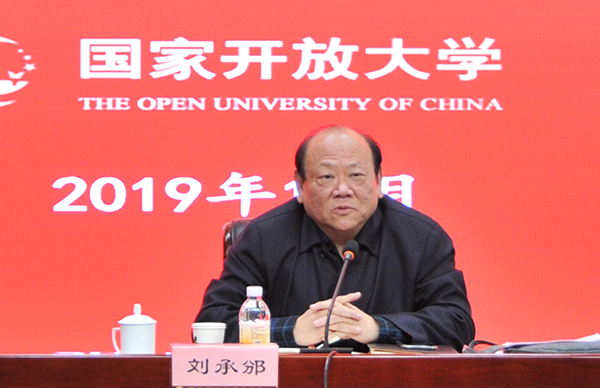
Liu Chengbin gave a lecture entitled The Construction of High-level Teaching Teams. He analysed and explained the necessary conditions for the construction of teaching teams, emphasising professionalism and discipline, advocating that team construction must have regular plans and goals, a resource base, and a self-monitoring mechanism. In addition, he put forward basic requirements for the personnel structure of the team and the channels to guarantee team quality.
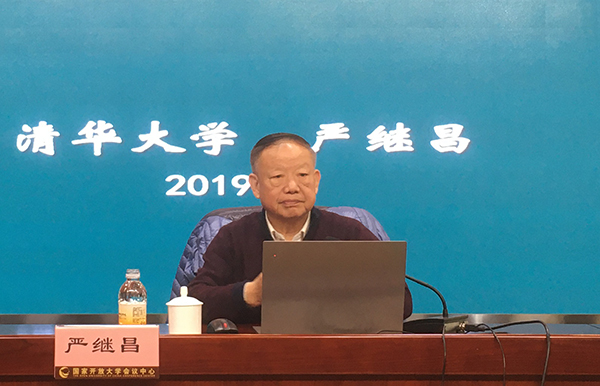
Yan Jichang gave a lecture entitled New Era, New Mission, New Roles: Striving to Create a New Pattern for the Development of Continuing Education in Colleges and Universities. He elaborated on the new situation facing the development of continuing education in colleges and universities, and pointed out the important role of informatisation in promoting the modernisation of continuing education in the context of the "Internet+" era. He proposed building a mechanism that can provide more supplies, a superior system, and a complete guarantee.
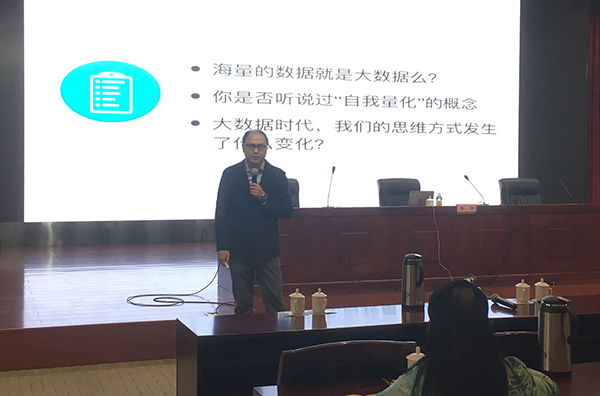
Professor Li Qing gave a lecture entitled Data-driven Teaching. He explained the importance of data-driven teaching in the context of big data and introduced the application scenarios of data-driven teaching, such as supporting students, helping teachers, and improving school management. In addition, he also introduced the difficulties faced in promoting data-driven teaching and the challenges that open education may face.
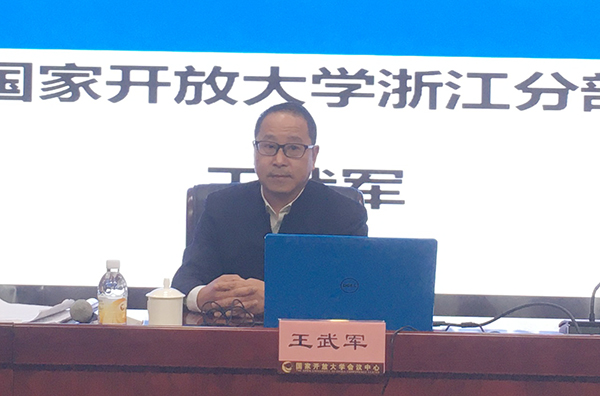
Wang Wujun gave a lecture entitled Cultivation, Excavation, and Fusion: Discussions on the Approach to the Teaching Reform of Ideological and Political Education in Courses. He expounded on the meaning and concept of ideological and political education in courses, vividly introducing the practical exploration of the teaching reform of ideological and political education in courses using excellent case studies from the Zhejiang Branch. He talked about the construction and conception of ideological and political education in courses, demonstrating a feasible solution for students of how to use ideological and political education in course teaching.
Three teachers from the OU shared their experience of excellent team building. Liu Zhanrong from the Faculty of International Languages and Cultures introduced the operation model of the online teaching team of the public English course against the background of the OUC’s "Six-Network Integration” model. He reviewed the progress of the construction of the public English course, proposed construction goals for the online teaching team of public English course, and introduced the multi-modal teaching reform pilots of the public English course. Yin Zhiying from the Faculty of Agroforestry and Medicine introduced the courses of Human Physiology, Human Anatomy, and Histology and Embryology courses and their online teaching team. He believes that we should adhere to the course of teaching team construction and strengthen curriculum construction, teaching reform and research, and online teaching in order to promote the construction of online teaching teams through mechanism construction. Han Yanhui from the Faculty of International Languages and Cultures introduced the operation of the first-level coordinated online teaching team in the computer-assisted English teaching and learning course. In combination with the management course, he clarified the duties of the different roles of team leader, academic teacher, and administrative teacher in the online teaching team from the perspective of team building. He proposed solutions to the unique problems faced by the first-level coordinated team building.
The seminar also invited the teachers from the branches to share their experience of construction and operation during the implementation of team building. Huang Dafang from the Chengdu Branch introduced how they used the implementation team to coordinate the relationship between platforms, resources, and activities. Qu Xueliang from the Jiangsu Branch shared their successful experience of team building and quality assurance. Wang Tao from the Sichuan Branch explained the path of the Sichuan Branch in exploring demand-driven online teaching team construction.
Written by Zhou Mingkun, photographed by Wang Di and Zhao Zhengwei, OUC